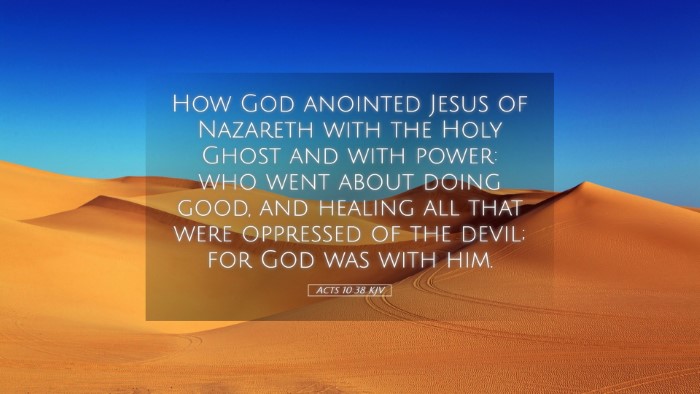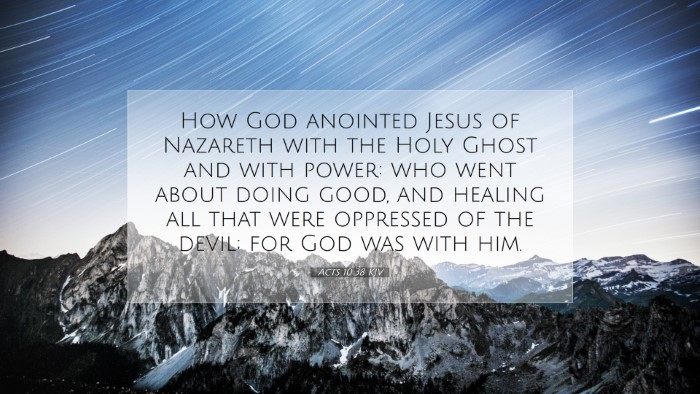Commentary on Acts 10:38
Acts 10:38 states, "How God anointed Jesus of Nazareth with the Holy Spirit and with power: who went about doing good, and healing all that were oppressed of the devil; for God was with him." This verse encapsulates the essence of Jesus' ministry and the divine endorsement that empowered His works.
Introduction
This verse is pivotal in understanding the nature of Jesus' mission on earth. It outlines how the divine anointing played a crucial role in Jesus' earthly ministry, emphasizing the goodness of His actions and the supernatural power that accompanied them. Several renowned biblical scholars have provided insights that enrich our understanding of this verse.
The Anointing of Jesus
Matthew Henry notes that the anointing of Jesus symbolizes His designation as the Messiah. The anointing with the Holy Spirit signifies that Jesus is equipped for His work of salvation. This divine empowerment is essential for the ministry He undertook, reflecting the fulfillment of multiple Old Testament prophecies concerning the Messiah.
Albert Barnes expands on the significance of the anointing, stating that Jesus was anointed "with the Holy Spirit" and "with power." This distinction is crucial as it highlights the duality of His endowment, where the Holy Spirit represents His spiritual enablement, while 'power' refers to the tangible manifestations of that enablement, notably miracles and healings. Such power illustrates how God exhibited His presence and approval through Jesus' works.
The Good Works of Jesus
The phrase "went about doing good" indicates not only the moral character of Jesus but also the active nature of His ministry. Jesus didn't remain passive; He engaged with society, addressing both spiritual and physical needs.
Adam Clarke emphasizes that the good works referred to are not limited to mere benevolence but are connected to the deliverance and healing provided to individuals oppressed by evil forces. Jesus demonstrated compassion for the marginalized, the sick, and the possessed, illustrating the comprehensive nature of His redemptive mission.
Healing the Oppressed
Jesus' ability to heal those "oppressed of the devil" signifies a profound spiritual warfare, where Jesus acts as the divine liberator. This aspect of oppression encompasses both physical sickness and spiritual bondage, indicating that Jesus' ministry brought holistic healing.
Matthew Henry emphasizes that Jesus' healing ministry embodies God's character and His desire for humanity to be free from spiritual and physical afflictions. It is a portrayal of God's benevolence actively engaging in the plight of humankind.
For God Was With Him
The conclusion of the verse, "for God was with him," underscores the divine presence and approval that accompanied Jesus throughout His ministry. This statement not only affirms Jesus' identity as the Son of God but also reassures believers that God's presence is crucial in all endeavors.
Albert Barnes interprets this as a reminder to Christians today that God’s presence with Jesus exemplifies the power available to believers. The anointing and empowerment are not uniquely reserved for Christ but are also available to those who follow Him and seek to partake in His mission.
Theological Implications
- The Nature of God: Acts 10:38 reveals God's nature as compassionate and powerful, actively involved in humanity’s suffering.
- The Role of the Holy Spirit: The verse establishes the Holy Spirit's vital role in empowering not only Jesus but also His followers for ministry.
- Christ's Precedence: Jesus serves as the model for Christian living and ministry, setting a precedent for believers to 'do good' and engage in acts of healing and compassion.
Conclusion
Acts 10:38 provides a concise yet profound summary of the Christian mission as exemplified in Jesus’ life. As pastors, students, theologians, and scholars reflect on this verse, it invites a deeper understanding of the implications of Jesus’ anointing, the goodness of His works, and the active presence of God. In an age where the struggle against oppression continues, the message of Christ remains potent—He is equipped to heal, liberate, and restore.


